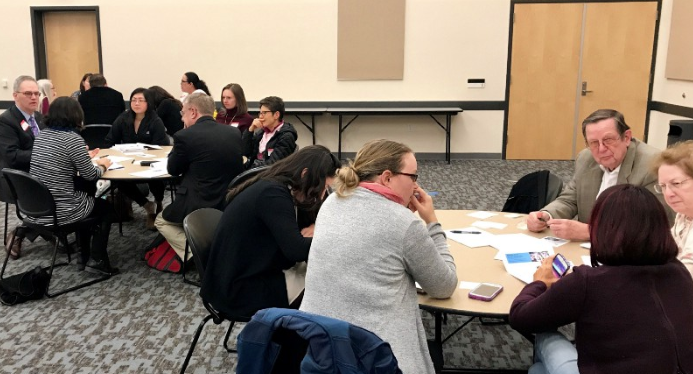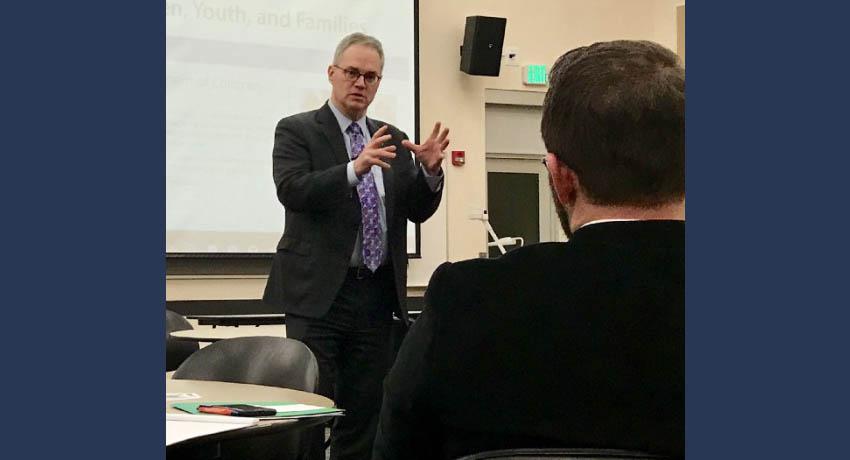Up until now, merging into the Department of Children, Youth, and Families has seemed like a far-off prospect, something happening “next” year. Well, that year is now upon us. In six short months we will come together to form a new agency, an agency with a relentless focus on outcomes for children and fueled by deep respect for each other and the families we serve. Getting to July 1 is a challenging task, and teams from the agencies of origin have been working hard to ensure everything is ship shape on day one. Below is a brief rundown of progress on our transition project.
I’ve been getting a lot of valuable feedback from staff and stakeholders as I travel across the state. I’ve been impressed by the dedication of employees and touched by everyone’s willingness to take time to meet with me and share thoughts and concerns. I’m doing my best to absorb these ideas and pass them along to appropriate internal workgroups. Keep them coming.
This is a dense update. We’ve broken things up by categories to make it easier for you to browse.
Organizational structures:
This is a topic that we know everyone is wondering about. We will have some high-level organization structure information to share later this week, but here are some basic updates. We have both top-down and bottom-up work happening. Our workgroups are looking at functional organizational models for examples of what works well for agencies the size of DCYF (about 4,000 people, larger than DEL but smaller than DSHS) and making proposals about how best to set up individual functional teams. I’ve also been thinking about organizational models at the agency level.
The Mission Team (see description below) tasked DEL acting director Heather Moss with gathering structured feedback from employees at all the agencies of origin, stakeholders, and tribes on our regional structure. It’s been pretty clear to many of us that three regions don’t really work for CA. Additionally, there are inefficiencies with each program at DEL having its own regional structure. Heather held a large meeting on this topic in Yakima recently and has been collecting useful feedback. Our options for July 1 are pretty limited if we don’t want to take crazy risks (and we don’t). We’ll most likely adopt a short-term proposal and then do more work to design a long-term solution. Any regional structure has to be integrated with the software we use, including FamLink, so it will take some time to adopt. The hope is to make our regions useful organizing functions that support client-focused strategies and implementation of services. We’ll have more details on all of this soon.
Our top-level goal in looking at this is to reflect our desire for an integrated service array in the work structure, enabling people to work together across disciplines. That said, most of the everyday work on the ground won’t be directly affected by these moves in the short-term. I want to re-iterate here that we are not planning any layoffs in this project, nor are we planning to reduce people’s compensation to achieve our goals.
Buying back services:
Many administrative functions make up a state agency, and our workgroups are figuring out which ones can be moved into the new agency on the first day. The groups are starting with the assumption that DCYF will perform its own administrative functions from the beginning. However, there will be some exceptions to that, and the work groups have developed a framework for making those decisions. A recommendation to buy back a service from DSHS is being considered if:
· The service is a specialized service difficult to replicate (e.g., Research and Data Analysis). We love what RDA does and don’t intend to replace it.
· The work required to transition and stand up the new DCYF service cannot be accomplished by July 1 (e.g., standing up the full DCYF IT network).
· Assuming responsibility for a service on July 1 would create an unwanted level of risk given the many demands on staff and management bandwidth for other must-do transition tasks (e.g., Social Service Payment System (SSPS, which we are planning to transition in on Jan. 1, 2019 to reduce payment risk and line up tax dates for our customers).
Organizational change management
One of the key principles in forming the new agency has been to make decisions with a lot of intentionality and to put our clients and staff at the center of this work. To that end, we are in the process of procuring some organizational change management expertise to support our efforts. This will help us with the process for developing the agency mission, goals, values and culture we want for DCYF, to help manage the change of creating a new agency and to help build the capacity of our supervisors and managers to support people through this change. We expect to have the consultant on board by early spring.
New DCYF staff
The new agency has more than doubled in size over the past month (from four people to nine!). To complete the work tasked to the Office of Innovation, Alignment, and Accountability (OIAA), Vickie Ybarra, the DCYF director of research and policy, has hired three exceptional staff and will be engaging two specialized fellows. Here’s a little bit about the work they’ll be doing, and you can read their full bios on the DCYF website.
- Stacey Gillette will be the DCYF/OIAA policy analyst assigned to the performance-based contracting effort. This portfolio will work with a cross-agency work group composed of contracting experts from each of the three agencies of origin (CA, DEL, and JR).
- Jessica Horst will be the DCYF/OIAA policy analyst assigned to the child outcomes/analytic framework portfolio to establish the overarching child outcome goals for the new agency and the analytic framework to support those goals. She will work with the cross-agency work group composed of the research/data leads from the three agencies of origin.
- Holly Wyrwich will be the DCYF/OIAA policy analyst assigned to the performance assessment portfolio to establish baseline performance measures for the three areas of work (child welfare, early learning and juvenile justice). She will be working with a cross-agency workgroup composed of the research/data leads from the three agencies of origin as well as with DCYF’s external consultant on this work, Chapin Hall at the University of Chicago.
- Additionally, we’ve worked with the national organization Foster America to establish two one-year fellowships for two staff who come from the consulting world to help us for one year in specialized areas — building the integrated services approach and planning an integrated data warehouse.
Mission work kick-off
Vickie Ybarra, and I kicked off work on developing an integrated services approach for DCYF with an initial meeting in early December. Policy, IT, finance and program staff from the agencies of origin came together to begin the project to meet the legislative mandate for the new agency: “ … to improve service delivery and outcomes, existing services must be restructured into a comprehensive agency dedicated to the safety, development, and well-being of children … ”
There is not necessarily a roadmap or one correct way to approach this work. We recognize that moving through our systems is not always a linear, or easy, process for children, youth and their families. Furthermore, we know that the individual needs they come to us with mean there are many combinations of experiences for them while they are system-involved. To analyze the system thoughtfully, we’re starting by looking at the following client experiences:
- community/family support
- early systems involvement
- remediation/intervention/active CA/JR involvement
- launch/transition out of CA/JR services
- child/youth/family flow through our systems
As we examine our customers’ experiences with these stages of system involvement, we’re asking ourselves the following questions:
- What do we already know about this area?
- What additional information do we need? From where?
- Who else do we need at the table?
Vickie mentioned that she was especially pleased to hear about the shared values from staff across all three agencies — the values of supporting families to be their best; belief in the innate capacity of families; and of the importance of respecting and supporting the staff and contractors who work directly with children, youth and families in our systems. We’ll be engaging with more staff on this effort in the months to come, and working with a wide variety of stakeholders as well. More information on this work will be coming soon.

I’ve enjoyed getting to know so many future stakeholders and colleagues, and feel humbled daily by the monumental task we have in front of us. Thank you to everyone who’s been willing to engage and think outside the box. 2018 is going to be a momentous year, and I look forward to sharing it with all of you.
Ross Hunter
Secretary, Department of Children, Youth, and Families

